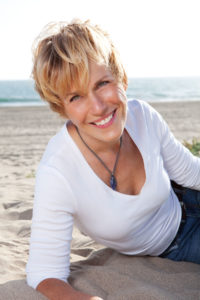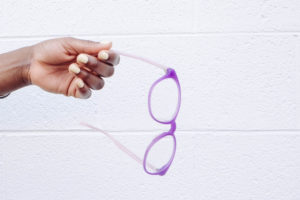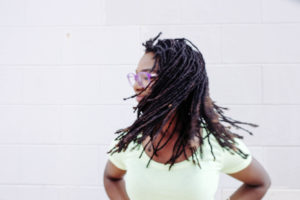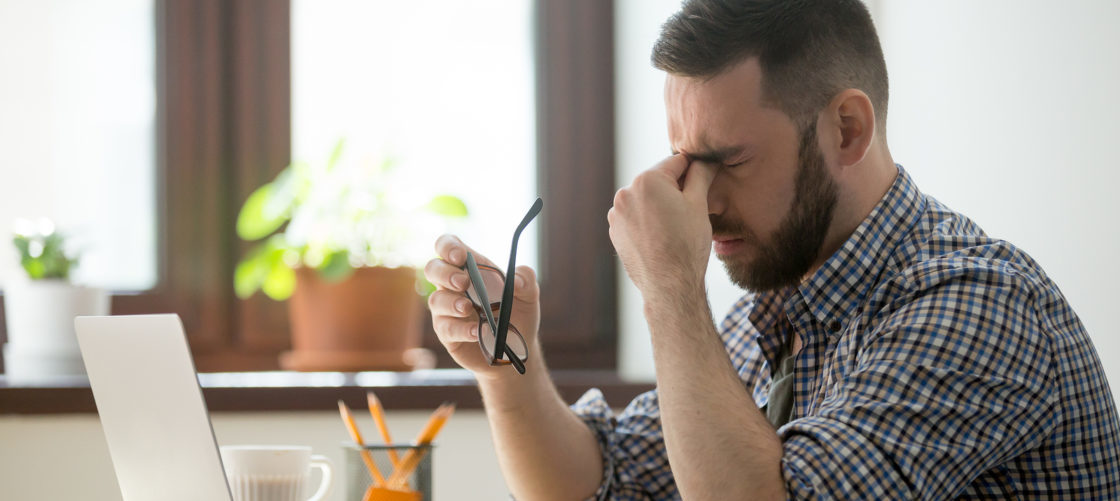When Claudia Muehlenweg was a toddler, she struggled to see well with both eyes. Her right eye kept turning in, and she wore eyeglasses at the tender age of 3. While they helped her vision, she was teased and bullied by her classmates.
 Years later she joined a handball team and wasn’t allowed to wear glasses for safety reasons. As her skills and confidence grew, her eyesight improved in tandem. And she was able to ditch the glasses altogether.
Years later she joined a handball team and wasn’t allowed to wear glasses for safety reasons. As her skills and confidence grew, her eyesight improved in tandem. And she was able to ditch the glasses altogether.
However, that feeling of freedom, joy and confidence was short-lived. Her eyesight worsened during her rocky marriage. And she continued to suffer from poor vision after she divorced and lived the life of a single mom, constantly stressed and sleep-deprived.
When I was confused and insecure about where I was and how I fit into the world, my vision was blurry. But when I was happy, successful and felt connected to others, my vision was clear.
An insightful epiphany
Fast forward to Claudia in her 40s … after a party in the Los Angeles neighborhood of Silver Lake, she had an epiphany. Her emotional well-being was related to her visual well-being. “Everybody at the party was good-looking and sexy,” says Claudia. “I didn’t know any of the guests and felt incredibly disconnected.” After an hour or so she decided to drive back home to her home in West Los Angeles.
 It was a moonless night, and Claudia found herself lost in a sketchy part of downtown L.A. She pulled out her Thomas Guide — a book used to navigate Los Angeles before Google Maps existed. “The print was so tiny I could barely read anything,” she calls. “Somehow I made it home. When I took my glasses off, everything was super blurry, much more than normally.”
It was a moonless night, and Claudia found herself lost in a sketchy part of downtown L.A. She pulled out her Thomas Guide — a book used to navigate Los Angeles before Google Maps existed. “The print was so tiny I could barely read anything,” she calls. “Somehow I made it home. When I took my glasses off, everything was super blurry, much more than normally.”
After a few minutes of crying, she realized, “When I was confused and insecure about where I was and how I fit into the world, my vision was blurry,” she explains. “But when I was happy, successful and felt connected to others, my vision was clear.”
The path to holistic healing
Through her yoga teacher, Claudia learned about the Natural Vision Improvement Teacher Training. Working one-on-one with her teacher, her vision improved until she was again able to stop wearing glasses.
“I felt joy again. I felt attractive and sexy,” she describes. “Forty didn’t feel like being over the hill anymore.”
She immersed herself in the study of eyesight. “The more I learned, the more fascinated I became with vision, realizing it goes well beyond the eyeball.”
And the moment she helped her very first client during training at the College of Vision Education in London she realized this what she was born to do. Since becoming a holistic vision coach in 2009, Claudia has helped many people improve their eyesight naturally and feel better overall.
At the time, she had worked for many years in advertising as an art director. But art simply wasn’t her passion any more. In fact, she had grown sick of the job altogether. “I wanted to make a difference in the world, not help to sell more stuff people didn’t need,” she explains. “I wanted to help others achieve great eyesight like I did.”
It doesn’t matter how old you ares. That’s because with any vision problem, it’s based on mental and physical strain.
Shifting to a new normal
Through her business, Holistic Vision, Claudia is helping people improve their eyesight naturally.
That’s right. No surgery or drugs, simply improving one’s eyes naturally. “It doesn’t matter how old you are,” she says. “That’s because with any vision problem, it’s based on mental and physical strain.”
As Claudia explains, the traditional eyecare industry just focuses on the eyeball. But while your eyeballs undoubtedly plays a crucial role, your vision is actually 90 percent brain.
Bringing back little-known eye care methods
Claudia hopes to help those with what’s called refractive errors — nearsightedness, farsightedness and astigmatism — heal and improve through the Bates Method. While the practice has actually been in existence since 1880s, the Bates Method is a bit of an underground movement. Treatment entails education, eye exercises, relaxation methods and making dietary changes.
 While not everyone will be able to achieve perfect vision, they can certainly get better.
While not everyone will be able to achieve perfect vision, they can certainly get better.
“Neuroscience confirms that our brains are plastic, meaning they can change,” points out Claudia. “Yet optometry and ophthalmology treat the eyes based on a 200-year-old theory that implies that functional, neurological and physiological changes cannot be reversed without drugs or surgery.”
She continues: “Glasses and contacts are prescribed like candy, even though they manifest in the body what was created by emotional or lifestyle triggers. The brain tells the body what to do. So if the world becomes scary and overwhelming after emotional trauma, the brain will mute the senses and tell the body to look for safety. That includes blurring the eyesight. Or one works all day at the computer without blinking, with shallow breathing, with a tilted head posture, straining all day. That will also result in blurry vision.”
Creating a shift in the world
“Working with people one-on-one is very fulfilling, but it’s not creating a shift in the world,” she says. And while she’s worked as a freelance art director while doing vision work with private clients in the past decade, Claudia is turning Holistic Vision into a full-time business through an online course and platform.
As she thrives on collaboration, she wants to work with experts in the holistic health and wellness space on everything from marketing, sales and finances, to developing the educational platforms and courses.
Holistic Vision certainly isn’t an overnight cure, because improvement of vision naturally depends on one’s level of commitment and acceptance. That being said, Claudia hopes to change the way people see eye care and their capacity to improve without corrective lenses or surgeries.
We have an epidemic of declining vision around the world.
Removing barriers
“With eyecare, it’s like having a broken leg, and you go to the doctor and they tell you they’re going to put this cast on you,” explains Claudia, who grew up in Germany and currently lives in Los Angeles. “But you know what? You have to wear that for the rest of your life.”
She hopes to turn that around. “We have an epidemic of declining vision around the world,” says the vision expert.
“Glasses are barriers to other people,” she says. “I want holistic treatment and healing of the eyes to be the preferred choice.”
The views and opinions expressed are those of the guest author and do not necessarily reflect the views and opinions of MindShift.money.
image credit: Bigstock/fizkes
Jackie is a personal finance writer and content marketer. She is passionate about telling money stories and spreading financial literacy to a mainstream audience.
